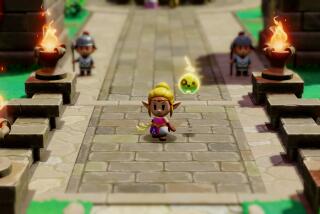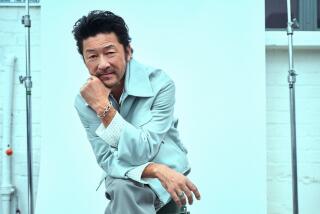What’s the enduring power of ‘Pokémon’? A newbie and expert discuss ‘Shield’ and ‘Sword’
- Share via
About two years ago I was in the presence of royalty.
Junichi Masuda, long instrumental in driving the development of the “Pokémon” franchise, stood up at the end of our 45-minute interview at the Electronic Entertainment Expo. After goodbyes, via a translator, there was a brief awkward moment as no one appeared to be moving. A Nintendo rep noticed the tension and quietly asked if I wanted a photograph with the master game developer.
Nintendo and Masuda were so accustomed to accommodating requests for a picture that it was practically an anomaly when there wasn’t one, even in this professional setting. Masuda has been with the “Pokémon” series since its mid-1990s beginnings and is therefore a key figure in one of the most prominent cultural mainstays of the past two decades, an interactive creator who has had a major hand in generation-defining pop— art.
And I missed it all.
When the early wave of the “Pokémon” craze hit in 1996, I was nearing the end of high school; my interests were more “Trainspotting” and “Quake” than Pikachu and Squirtle. My first “Pokémon” experience was “Pokémon GO,” more of an augmented reality sensation than a proper “Pokémon” adventure. When I spoke to Masuda it was before the release of “Let’s Go, Pikachu!” and “Let’s Go, Eevee!” and a full year before this year’s “Sword” and “Shield” entries in the series, games that assuredly will be among the biggest of 2019. Nintendo has already stated that the games sold more than 6 million copies in their first weekend of release.
During my time with Masuda, I wanted to know not just what I’ve been missing, but why “Pokémon” endures. His first thought: The world of “Pokémon” is “comical.” And more than that, “It’s a kind feeling.”
“We’re definitely very careful about that,” Masuda said of the cartoonish role-playing games that feature trainers raising mystical creatures and sending them off into battle. “We’re not trying to portray realism, in terms of real-world realism. We want to show off this cool fantasy setting, but within that fantasy setting create a consistent realism. Even though there’s moves that poison the opponent, we still make those effects that don’t look super serious or intimidating.”
After a couple of weeks playing “Pokémon Sword,” I’m charmed. The game is full of sly asides that bring a smile to my face, whether it’s nonsense weirdness such as “Ball Guy,” a dude with a “Pokémon” ball as a head, or a brief run-in with some toxic fans — a moment that feels very in tune with 2019 social media, not to mention some of “Pokémon’s” own community who have been acting personally attacked that the new games feature a pared-down roster of little monsters.
But while I’ve been having fun, I still wanted to better understand what makes “Pokémon” a cultural force, one that remains a global franchise that can rival the Marvel Cinematic Universe.
Luckily I work with Tracy Brown, a peer and friend whose “Pokémon” knowledge vastly outshines my own. (Earlier this year, she covered the “Detective Pikachu” film.) We decided to play “Sword” and “Shield” concurrently, to see how a knowledgeable fan and a newcomer view the same game and, in turn, what makes “Pokémon” universal.
So Tracy, what’s your initial takeaway of the new game, and what about “Pokémon” continues to speak to you?
TRACY BROWN: I am having a blast with the new “Pokémon.” As a person who grew up on a steady diet of kaiju movies and Japanese curry rice, a lot of the new features introduced in “Sword” and “Shield” — like battling giant Pokémon and cooking all kinds of curries — could not have been better tailored to appeal to someone like me. I’ve spent a significant amount of time on these side activities while ignoring the main narrative.
But I’m getting ahead of myself.
The draw of “Pokémon” for me has always been the Pokémon themselves. They’re cute and they’re weird and there are so many different kinds of them. The excitement of each new game is encountering brand new Pokémon and trying to catch them all. Picking a partner Pokémon at the beginning of the game is still one of my favorite parts because they basically are your in-game best friend as you go on this journey.
As I’ve grown older, I’ve also started to appreciate the sort of gentleness of the game’s fantasy world. That might sound weird since the point of the game is to have little creatures battle each other, but this is a world where parents are OK with 10-year-olds setting off on cross-country adventures to chase their dreams with nothing but a backpack and a pocket monster.
Plus, there are free medical facilities that heal Pokémon. There are some bad guys and crime syndicates, but their plots can be foiled by kids. It’s a beautiful, simple world to escape to, which I think “Sword” and “Shield” have really leaned into by playing up the pure joy people within the world get from watching Pokémon battles and the celebrity that comes with being a champion Pokémon trainer.
My perception from how some of the gameplay has evolved over the years is that “Sword” and “Shield” are pretty new and casual player friendly.
How are you finding the game, Todd? And most important, what starter Pokémon did you choose?
TODD MARTENS: I didn’t know what “starter Pokémon” even meant until a few years ago. I’ve come to realize that this choice of which creature to raise and be the primary fighter throughout the game can cause a great deal of stress to series regulars, but I didn’t overthink it.
I went with Sobble, since at the start Sobble sort of looks like a walking, sad little teardrop. Another starter, Scorbunny, struck me as overly confident and I tend to find that trait a turn-off, so give me the sad “Pokémon.” That being said, Sobble has now grown into something akin to a sullen teen, so I might be scared of Sobble at the moment.
I definitely feel like “Sword” and “Shield” are overtly friendly to newcomers in ways some of the other core games in the series didn’t strike me. It’s curious to me that you noted how these titles sort of play up the joy of the world, in turn maybe fleshing out the world a bit. I know “Detective Pikachu” is an oddity and an outlier in the world of “Pokémon” — a vastly different type of game experience — but the film appealed to me because of the relationships with “Pokémon” and showing what a world with “Pokémon” may look like.
BROWN: Yes, and I think “Pokémon” being a multimedia franchise has definitely helped enrich the core story of the games over the years.
I think “Sword” and “Shield” let players see a world where you can really understand why a kid would want to take this journey into becoming a Pokémon champion. You also get glimpses as to how and why certain gym leaders —the various “bosses” players must challenge to advance in their journey — are in the positions that they are in. The game’s coming-of-age quest is that much more compelling when everything is fleshed out.
These elements are definitely reflective of the ways the “Pokémon” games have evolved, and I think speaks to why some of us keep coming back for more. (That is, in addition to the fun of catching and watching your Pokémon evolve.)
I also want to point out how the different reasons we picked different starter Pokémon shows how varied the experience can be. What you saw as overly confident in Scorbunny, I just took as excitable athlete. I picked the energetic bunny (who has since evolved into something like a soccer champion) partly because he was cute, and also because past “Pokémon” have taught me that there are generally more water-type Pokémon (like Sobble) in the game than fire-types (like Scorbunny), so it made a bit more strategic sense.
But that prior knowledge is not at all crucial to enjoy the game.
MARTENS: One of the primary appeals of games is that they can become unique stories to those who play them, regardless of the game’s plot, largely because they can be open-ended enough to allow for individual exploration. I like the way you’ve latched on to some of the game’s cultural explorations. In my early hours, I was taken with its sense of eternal playfulness, how the unknown — and growing up — is viewed with a mix of curiosity and apprehension. I’m thinking of when one of the characters expresses shock that someone once left town and came back in “real estate,” as if they had forsaken the magic of “Pokémon.”
I had read a little about how the game includes nods to climate change — I was struck by reports in numerous other outlets that noted horrific changes to Corsola, a coral “Pokémon” — but I don’t think “Pokémon” is out to make a statement. While one could draw conclusions from the coal mines and adult businesses, I found the reason I wanted to spend time in this world was because it embraces players with a hug. There are real-world realities here and there, and therefore I wouldn’t say this is a a child’s game but a game that captures the point of view of the young, hopeful at heart.
I was reminded of a comment from Masuda when I asked him to reflect on how now multiple generations have fallen for “Pokémon,” and he more or less said it’s because “Pokémon” doesn’t try to age with its players. Masuda talked about his love of shoot‘em-up arcade games of yore and how their increased complexity and difficulty meant they were only speaking to the same people year in and out. He didn’t want to take the game “in a direction that’s not approachable,” he said.
“I think a lot hardcore fans maybe want us to pursue a more realistic, heavier, hardcore, dark portrayal,” he said. “I of course listen to their feedback, but I try to go in the direction that we lay out for ourselves. One example I go back to: I was always a big fan of the shoot‘em-up genre. But that genre would keep going in a more hardcore, hardcore, hardcore direction until they got to a point that where only a few people could enjoy it.”
My biggest fear before starting the “Pokémon” game was there would be two decades of lore and myths and a language that I just wouldn’t understand, like someone watching “Avengers: Infinity War” without having seen other Marvel films. I was pleased that “Pokémon” essentially laid out the welcome mat.
'Pokémon Sword' and 'Pokémon Shield'
More to Read
The biggest entertainment stories
Get our big stories about Hollywood, film, television, music, arts, culture and more right in your inbox as soon as they publish.
You may occasionally receive promotional content from the Los Angeles Times.












